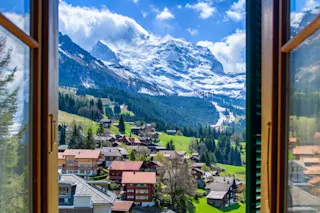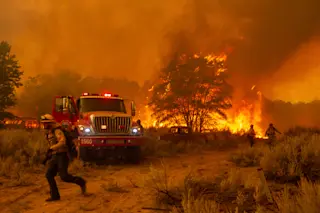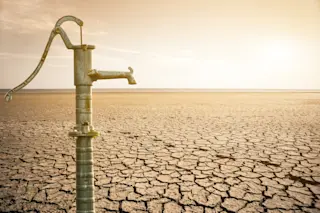In 2009, the New York Times launched "a new, crack environmental reporting unit that will pull in eight specialized reporters from the Science, National, Metro, Foreign, and Business desks in a bid for richer, more prominent coverage," as the Columbia Journalism Review (CJR) detailed. It seemed like a smart, innovative approach: Environmental issues have become increasingly complex, with crosscutting scientific, economic, and political angles. Climate change, seen by many as the story of the century, is the poster child for this complexity. So efforts "to push the story forward, to give it greater energy and focus," as a NYT memo described at the time, were largely applauded by journalism watchers. Alas, the experiment didn't pan out to the Times' liking; in 2013 the paper's management abandoned the environment "pod." The Times, of course, is still actively covering environmental stories, particularly climate change. Whether it is doing so with the kind of dedication and imperative it had declared in 2009 remains an open question. After the decision was made by the Times in 2013 to dismantle the special environment team, I agreed with Margaret Sullivan, the NYT Public editor, who wrote that "symbolically, this is bad news." It signaled that environmental coverage was deemed not important enough to warrant greater resources and sustained focus. Meanwhile, the Guardian, a leading newspaper in Britain, has in recent years signaled the opposite: It routinely features environmental stories on its digital homepage and has expansive online commentary and analysis from numerous green-oriented writers. (Compare that with the Times, which shuttered its lone environment blog months after dismantling the beat's special unit.) And now, Alan Rusbridger, the Guardian's much admired outgoing editor-in-chief, has announced that between now and this summer, when he steps down, the paper will prominently feature on its home page articles on the "climate threat." In reflecting on his 20-year tenure as the paper's editor, he wondered about missed opportunities:
Very few regrets, I thought, except this one: that we had not done justice to this huge, overshadowing, overwhelming issue of how climate change will probably, within the lifetime of our children, cause untold havoc and stress to our species.
And so, in his remaining time, he decided "to harness the Guardian’s best resources to describe what is happening and what – if we do nothing – is almost certain to occur" if the world doesn't kick its fossil fuel habit. This is an admirable initiative. Who can complain about a major newspaper putting the risks of climate change front and center every day for weeks and months? Well, I sort of did. To be clear, I don't object to man-made climate change being vigorously reported on and chronicled. When I was an editor of Audubon magazine in the 2000s, I worked with a great team of editors to put together two special issues on climate change. So I agree it's a story of huge importance that should be covered in all its dimensions. Rusbridger, in his piece, explained why the Guardian was now embarking on a special climate change series:
For the purposes of our coming coverage, we will assume that the scientific consensus about man-made climate change and its likely effects is overwhelming. We will leave the skeptics and deniers to waste their time challenging the science. The mainstream argument has moved on to the politics and economics.
I'm on board with that. Many so-called climate skeptics, I have concluded--at least the most vocal lot--are hostile to climate science for ideological and political reasons. They don't debate in good faith. So I'm fine with leaving them out of the story. However, I do think there are numerous worthwhile unanswered scientific questions to journalistically pursue with respect to climate change. Still, for the purposes of the Guardian's short-term objective, I think it's reasonable to focus on the economic and political aspects of climate change. Here's how Rusbridger defines that purview:
The coming debate is about two things: what governments can do to attempt to regulate, or otherwise stave off, the now predictably terrifying consequences of global warming beyond 2C by the end of the century. And how we can prevent the states and corporations which own the planet’s remaining reserves of coal, gas and oil from ever being allowed to dig most of it up. We need to keep them in the ground.
Here's where I start to have a problem. Rusbridger lays out a very narrow debate framed around certain assumptions that should not be taken at face value. For example, there are plenty of concerned climate scientists and analysts who don't believe that the 2C target can be met, and some of them argue persuasively that this indicator is not only unrealistic, but also impractical and unhelpful as a means to reduce carbon emissions. This argument triggered varied responses captured last year in a Guardian article. At the very least, it seems that this discussion seems worth continuing. But that apparently won't be happening at the Guardian, since the editor has taken the 2C target as an article of faith. Then there is the other main objective of the Guardian's renewed climate change focus: How to prevent the world's remaining fossil fuel reserves from being used by countries and energy companies. "We need to keep them in the ground," Rusbridger writes. Fine. Let's pivot off that assumption. But the starting point, Rusbridger says, will be the writings of two climate activist/authors--Bill McKibben and Naomi Klein. At this point, it seemed obvious to me that the tenor and scope of the special attention Guardian was giving to climate change had an advocacy feel to it. I mentioned this online to Gavin Schmidt, a climate scientist and Director of the NASA Goddard Institute for Space Studies (GISS),who had applauded the Guardian editorial by Rusbridger. I have a lot of respect for Schmidt. We had a cordial Twitter exchange that glancingly touched on journalism norms, science communication, and the Guardian's illustrious history. At one point, a few others jumped in to express their irritation at the way I characterized the Guardian manifesto. They objected to my labeling it as "advocacy" journalism with a "slant." I replied that I thought those characteristics were self-evident, but agreed that I should reserve final judgement of the Guardian's special series on climate change until it had ran its course.













